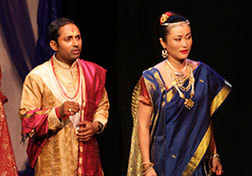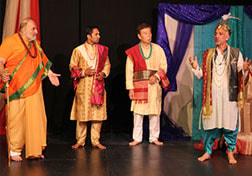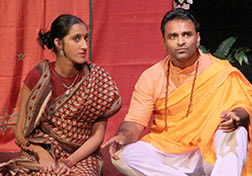
BY DEVIKA C. MEHTA
‘Sacrifice’ a great play by the Indian Noble laureate Rabindranath Tagore wooed the Los Angeles audience during the last few weeks of July at The Broadwater Theatre in Hollywood. A total of six enthralling performances drew huge crowds and earned rave reviews at the famous venue. The play has been brought to the fore by...
‘Sacrifice’ a great play by the Indian Noble laureate Rabindranath Tagore wooed the Los Angeles audience during the last few weeks of July at The Broadwater Theatre in Hollywood. A total of six enthralling performances drew huge crowds and earned rave reviews at the famous venue. The play has been brought to the fore by...
the intrinsic and skilled Iranian Director Aramazd Stepanian- a man of many words, who also loves to explore his art and expression..
Talking to India Journal, he elaborated on his choices, determined aspirations and future endeavors.
Talking about ‘Sacrifice’, Aramazd said, “It is a great play. It is a director’s dream. A great play inspires the director and everyone else involved, to much higher levels of creativity and dedication. Written by one of the greatest and noblest of men who ever lived, the play is about human beings progressing from primitive cruelty and brutality to gentility and civility. It is a call to question that which has not changed with the changes of time.”
Hinting at the story, he narrated, “It is a tale where a king wants to make change for the better, moved by the sorrow of someone who has lost that which is precious to her to the uncaring, self-righteous authority. And his attempt at this reform is opposed, not only by those who are benefitting from the way things are, but also from those, who given the time and the chance, will see and agree with the changes suggested.”
However, his journey was not easy and strategically difficult. “I had difficulty in casting the play with solely South Asian actors, but I did not know anything about the ritualistic aspects, and particularly the music of Tagore. For instance, I did not intend to act in it myself, and only took over the role of Raghupati, when an Indian actor friend of mine fell ill; same happened with the role of Aparna. And as for cultural accuracy, I was the luckiest director in the world, to have met Rajshri Chakraborty and Piu Mahua Roy. They are worthy daughters of Rabindranath Tagore.”
The task to keep the originality and authenticity was even more challenging, as Aramazd puts it, “I never interfered with the work of great writers. Very minor shifting of a couple of lines here and there, as the circumstances of our production are very different from the time and situation of the writing of the play. However, I was told about the important differences between the Bengali original and this version, ‘translated’ by Tagore himself. It is much shorter for instance. And we have come across two versions, with one having a few more speeches than the other. I included three of the short speeches of the one version into the one we originally used. The challenging element was of course the music and dances, and of course the look of the stage and the costumes. All resolved by my colleagues Chakraborty, Roy, Koushik and the others.”
Insisting on the story’s relevance and target audience, Aramazd pointed, “A call to end or at least mitigate dogmatism and intransigence, a call against prejudice and cruelty—what could be more appropriate nowadays! In a sense I don’t have to bring anything to this play. It is all there. Tagore is saying it. Right from the beginning, our target was the general Los Angeles theatre going public, particularly the more discerning ones, but also counting on the Bengali/Indian community’s support, in the same way that whenever I stage an Armenian play in English translation, although aimed at the general public, I do expect and receive the Armenian community’s support.”
His personal favorite roles are: Uncle Vanya from Chekhov and Dr. Stockmann from Henrik Ibsen’s ‘An Enemy of the People’. “In real life I have been a great admirer of Peter Ustinov, a man not unlike Tagore- erudite, wise, kind-hearted and wonderfully gifted,” he added. And, his favorite stage show is? “I adore most of the works of the German playwright Bertolt Brecht. I also love the plays of the absurd, like ‘Waiting for Godot’. Tom Stoppard’s ‘Travesties’ is another (ingenious) play that I admire. The Armenian playwrights Aghasi Ayvazian and Karine Khodikian are world class playwrights and I am going to champion their work for the rest of my days. I admire the Italian playwright and comic genius Dario Fo. I am also going to stage more of Tagore’s work, now that I have come to know all the wonderful Indian artists and actors, who will make sure that our productions are culturally authentic.”
His other passions involve painting with colored pencils, visiting painting museums, galleries and exhibitions, exploring opera and dance, and listening to music. Sharing his message for LA audience, Aramazd concluded, “It is often said that the thriving Los Angeles theatre scene is a well-kept secret. There are a lot of good theatre productions and theatre people doing a lot of good work—I know because I see at least fifty plays a year—but because the area is dominated by film and TV, theatre is considered a distant third in importance. One major effect of this is the huge difference between resources available for film and TV on the one hand and theatre on the other. If there were more balance, by audiences paying more attention (and money) to theatre, then they would see the great advantage of seeing a good, live theatre performance.” Aramazd plans to have a short rest after the `Sacrifice’ shows, and then embark on the 2018-2019 season, which will include a George Bernard Shaw play and almost certainly another Tagore, plus a couple of Armenian plays. Born an Armenian and raised in Iran, Aramazd went to England for his further education. After graduating with a BA degree in politics, philosophy and drama, he then trained as an actor and also studied stage directing. In the 90s, he moved to Los Angeles and worked for a long time as a manager for a facility for people with disabilities, in parallel with his theatre producing-directing work. So far, he has staged Armenian, American, Japanese, Persian, Russian, other European work and also translated-adapted work from Armenian to English and vice-versa.
Talking to India Journal, he elaborated on his choices, determined aspirations and future endeavors.
Talking about ‘Sacrifice’, Aramazd said, “It is a great play. It is a director’s dream. A great play inspires the director and everyone else involved, to much higher levels of creativity and dedication. Written by one of the greatest and noblest of men who ever lived, the play is about human beings progressing from primitive cruelty and brutality to gentility and civility. It is a call to question that which has not changed with the changes of time.”
Hinting at the story, he narrated, “It is a tale where a king wants to make change for the better, moved by the sorrow of someone who has lost that which is precious to her to the uncaring, self-righteous authority. And his attempt at this reform is opposed, not only by those who are benefitting from the way things are, but also from those, who given the time and the chance, will see and agree with the changes suggested.”
However, his journey was not easy and strategically difficult. “I had difficulty in casting the play with solely South Asian actors, but I did not know anything about the ritualistic aspects, and particularly the music of Tagore. For instance, I did not intend to act in it myself, and only took over the role of Raghupati, when an Indian actor friend of mine fell ill; same happened with the role of Aparna. And as for cultural accuracy, I was the luckiest director in the world, to have met Rajshri Chakraborty and Piu Mahua Roy. They are worthy daughters of Rabindranath Tagore.”
The task to keep the originality and authenticity was even more challenging, as Aramazd puts it, “I never interfered with the work of great writers. Very minor shifting of a couple of lines here and there, as the circumstances of our production are very different from the time and situation of the writing of the play. However, I was told about the important differences between the Bengali original and this version, ‘translated’ by Tagore himself. It is much shorter for instance. And we have come across two versions, with one having a few more speeches than the other. I included three of the short speeches of the one version into the one we originally used. The challenging element was of course the music and dances, and of course the look of the stage and the costumes. All resolved by my colleagues Chakraborty, Roy, Koushik and the others.”
Insisting on the story’s relevance and target audience, Aramazd pointed, “A call to end or at least mitigate dogmatism and intransigence, a call against prejudice and cruelty—what could be more appropriate nowadays! In a sense I don’t have to bring anything to this play. It is all there. Tagore is saying it. Right from the beginning, our target was the general Los Angeles theatre going public, particularly the more discerning ones, but also counting on the Bengali/Indian community’s support, in the same way that whenever I stage an Armenian play in English translation, although aimed at the general public, I do expect and receive the Armenian community’s support.”
His personal favorite roles are: Uncle Vanya from Chekhov and Dr. Stockmann from Henrik Ibsen’s ‘An Enemy of the People’. “In real life I have been a great admirer of Peter Ustinov, a man not unlike Tagore- erudite, wise, kind-hearted and wonderfully gifted,” he added. And, his favorite stage show is? “I adore most of the works of the German playwright Bertolt Brecht. I also love the plays of the absurd, like ‘Waiting for Godot’. Tom Stoppard’s ‘Travesties’ is another (ingenious) play that I admire. The Armenian playwrights Aghasi Ayvazian and Karine Khodikian are world class playwrights and I am going to champion their work for the rest of my days. I admire the Italian playwright and comic genius Dario Fo. I am also going to stage more of Tagore’s work, now that I have come to know all the wonderful Indian artists and actors, who will make sure that our productions are culturally authentic.”
His other passions involve painting with colored pencils, visiting painting museums, galleries and exhibitions, exploring opera and dance, and listening to music. Sharing his message for LA audience, Aramazd concluded, “It is often said that the thriving Los Angeles theatre scene is a well-kept secret. There are a lot of good theatre productions and theatre people doing a lot of good work—I know because I see at least fifty plays a year—but because the area is dominated by film and TV, theatre is considered a distant third in importance. One major effect of this is the huge difference between resources available for film and TV on the one hand and theatre on the other. If there were more balance, by audiences paying more attention (and money) to theatre, then they would see the great advantage of seeing a good, live theatre performance.” Aramazd plans to have a short rest after the `Sacrifice’ shows, and then embark on the 2018-2019 season, which will include a George Bernard Shaw play and almost certainly another Tagore, plus a couple of Armenian plays. Born an Armenian and raised in Iran, Aramazd went to England for his further education. After graduating with a BA degree in politics, philosophy and drama, he then trained as an actor and also studied stage directing. In the 90s, he moved to Los Angeles and worked for a long time as a manager for a facility for people with disabilities, in parallel with his theatre producing-directing work. So far, he has staged Armenian, American, Japanese, Persian, Russian, other European work and also translated-adapted work from Armenian to English and vice-versa.




 RSS Feed
RSS Feed
